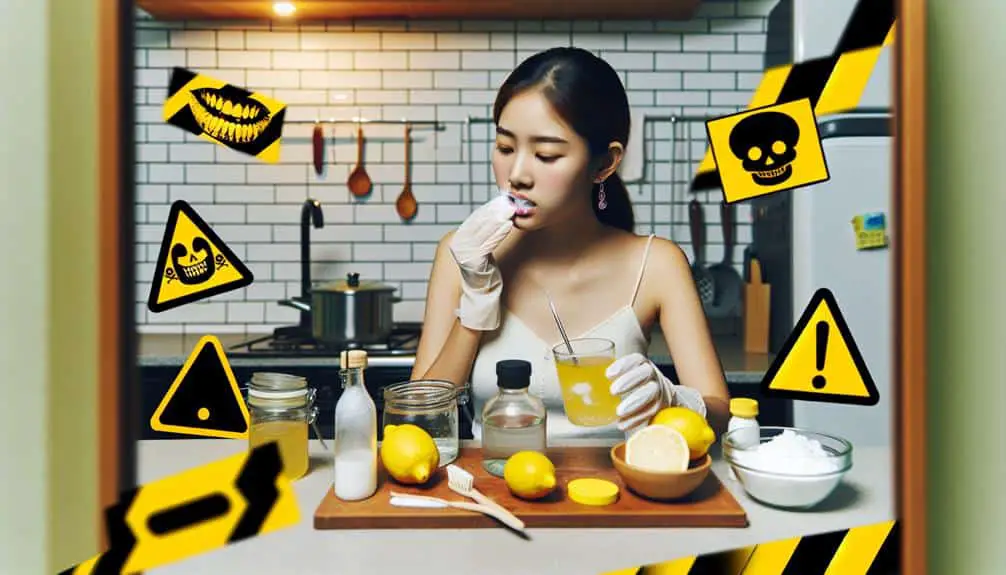Using DIY teeth whitening methods can lead to acid erosion, heightened tooth sensitivity, uneven whitening, and gum irritation. The acidic substances in these solutions can weaken enamel, making your teeth more sensitive to hot, cold, or sweet foods. Improper initiation may result in uneven whitening and potential gum damage. Be cautious of overusing harsh ingredients like lemon juice or baking soda, as this can erode enamel and lead to decay. Seeking advice from a dental professional before starting on any DIY whitening treatment is essential to safeguard your oral health.
Key Points
- Acid erosion from DIY methods weakens enamel, leading to tooth sensitivity.
- Uneven whitening and patchy results may occur with DIY techniques.
- Improper DIY whitening can cause gum irritation, redness, and burns.
- Overuse of harsh DIY ingredients can harm enamel, causing sensitivity and decay.
- DIY methods pose risks of serious dental health complications if not done carefully.
Acid Erosion and Tooth Sensitivity
If you regularly utilize DIY teeth whitening techniques, you may be unknowingly exposing your teeth to acid erosion, leading to heightened tooth sensitivity. Acidic substances, commonly present in DIY whitening solutions, can weaken the enamel, the protective outer layer of your teeth.
Enamel damage is a significant concern as it can pave the way for tooth sensitivity, making your teeth more susceptible to pain, especially when consuming hot, cold, or sweet foods.
To protect your enamel and minimize the risk of acid-induced damage, certain precautions are crucial. To begin with, be cautious of the ingredients in DIY whitening recipes. Components like lemon juice or vinegar are highly acidic and can erode enamel over time.
Next, consider using enamel protection toothpaste or fluoride rinses to strengthen your enamel. Finally, consulting with a dental professional before attempting any DIY whitening methods can offer personalized guidance and ensure the safety of your teeth.
Uneven Whitening and Discoloration
Uneven whitening and discoloration can result from DIY teeth whitening methods that inadequately target specific areas of your teeth, potentially leading to an unsatisfactory overall appearance. Patchy results may occur when the whitening agent isn't evenly applied or when certain areas of the teeth receive more exposure than others. This can create a visually unpleasing effect where some parts of your teeth appear whiter than others, detracting from the desired uniform brightness.
Moreover, DIY methods mightn't address underlying issues that cause discoloration, such as intrinsic stains from certain medications or dental conditions. By solely focusing on surface stains, you risk overlooking these deeper discolorations, leading to unsatisfactory results. Staining risks further compound the issue, as some DIY whitening products may not be effective in removing tough stains, potentially exacerbating the uneven whitening effect and leaving behind a blotchy appearance.
To achieve consistent and satisfactory whitening results while minimizing the risk of unevenness and discoloration, consulting a dental professional for personalized treatment options is advisable.
Gum Irritation and Damage
Gum irritation and damage may result from DIY teeth whitening methods that aren't carefully administered, potentially causing discomfort and harm to the soft tissues in your mouth. When the whitening agents come into contact with the gums, they can lead to irritation, redness, and even chemical burns if left on for too long or if the concentration is too high. To prevent such damage, it's vital to apply protective barriers like dental dams or petroleum jelly to shield the gums during the whitening process.
Proper care is essential to avoid gum irritation and damage when using DIY teeth whitening methods. Before starting any whitening treatment, it's recommended to consult with a dentist to make sure that the chosen method is suitable for your oral health. Additionally, following the instructions provided with the whitening product is crucial for minimizing the risk of gum irritation. If you experience any discomfort or notice irritation during or after whitening, discontinue use immediately and seek professional dental advice to prevent further damage.
Risk of Overusing Harsh Ingredients
Overuse of harsh ingredients in DIY teeth whitening can pose significant risks to your oral health and overall well-being, necessitating caution and moderation in their application. When it comes to tooth enamel, the protective layer covering your teeth, harsh ingredients can lead to erosion over time, causing irreversible damage.
Here are three critical points to keep in mind:
- Tooth Enamel Protection: Harsh ingredients like lemon juice or baking soda, often used in DIY whitening recipes, can wear down your enamel. Once the enamel is eroded, it can't regenerate, leaving your teeth vulnerable to sensitivity and decay.
- Risk of Enamel Erosion: Overusing abrasive substances can accelerate enamel erosion, leading to thinning of the enamel layer. This can expose the inner layers of your teeth, increasing the likelihood of cavities and other dental issues.
- Importance of Moderation: To safeguard your enamel and overall oral health, it's essential to limit the use of harsh ingredients in your teeth whitening routine. Consult with a dental professional for safe and effective whitening alternatives that protect your enamel.
Potential for Dental Health Complications
Continuously subjecting your teeth to DIY whitening methods with harsh ingredients can potentially lead to serious dental health complications, emphasizing the importance of understanding the risks involved.
One of the primary risks associated with these methods is the potential for enamel damage. Enamel, the outer layer of your teeth, is essential for protecting them from decay and sensitivity. Harsh whitening ingredients can erode this protective layer, leading to increased sensitivity, discoloration, and even decay in the long run.
Additionally, the oral health risks extend beyond enamel damage. DIY whitening methods can irritate the gums, causing inflammation and potentially leading to gum disease if not addressed promptly. Moreover, some DIY techniques may inadvertently expose your teeth to harmful bacteria, increasing the risk of infections.
Hence, it's crucial to prioritize your dental health and consult with a professional before starting any DIY whitening treatments to prevent these potential complications.
Frequently Asked Questions
Can DIY Teeth Whitening Methods Lead to Permanent Damage to Tooth Enamel Due to Acid Erosion?
Using DIY teeth whitening methods can lead to permanent damage to tooth enamel due to acid erosion. This can cause tooth sensitivity and enamel erosion over time, impacting the health and appearance of your teeth.
What Are the Potential Long-Term Consequences of Uneven Whitening and Discoloration From DIY Teeth Whitening?
When you opt for DIY teeth whitening, uneven results could lead to persistent discoloration risks and heightened teeth sensitivity. Uneven whitening may not only affect your smile's aesthetics but also impact your dental health.
How Can Gum Irritation and Damage From DIY Teeth Whitening Methods Be Prevented or Minimized?
To prevent gum irritation and minimize damage when whitening at home, make sure to follow instructions carefully, use products sparingly, and avoid overusing DIY methods. Consider consulting a dentist for professional advice on safe teeth whitening practices.
What Are the Signs of Overusing Harsh Ingredients in DIY Teeth Whitening Products, and How Can One Avoid This Risk?
To avoid overusing harsh ingredients in DIY teeth whitening, pay attention to signs like increased sensitivity or gum irritation. Preventing overuse involves following instructions carefully, using the recommended amount, and stopping if you experience any negative reactions.
Are There Specific Dental Health Complications That Can Arise From Consistently Using DIY Teeth Whitening Methods, and How Can They Be Prevented?
To maintain oral health and prevent damage, it's imperative to be cautious with DIY teeth whitening. Consistent use can lead to enamel erosion and gum sensitivity. Consult your dentist for safe alternatives and regular check-ups.



